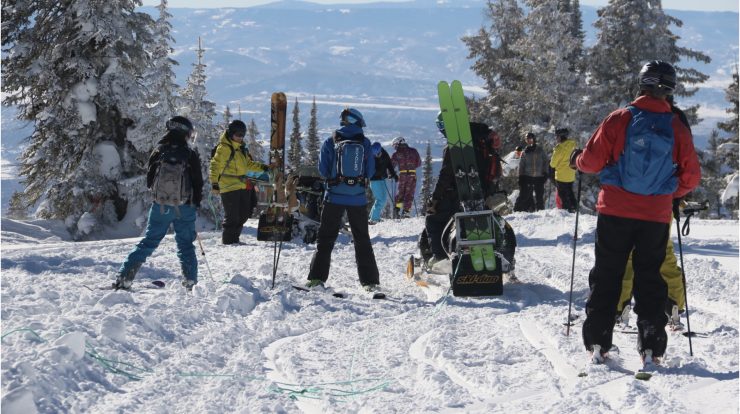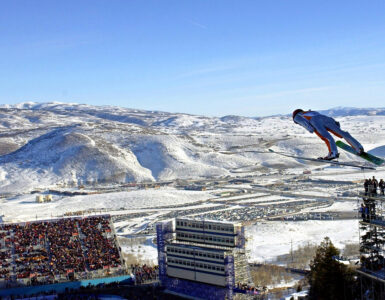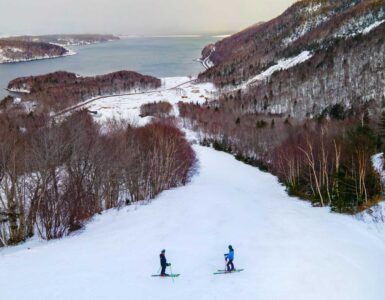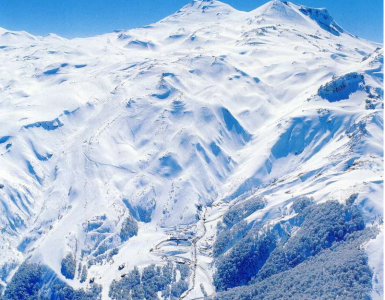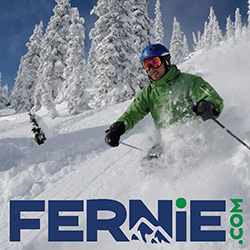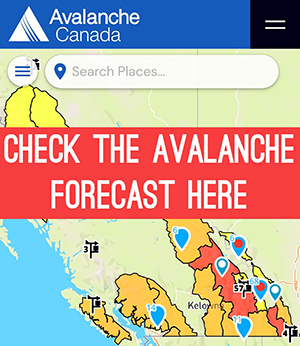Are Colorado’s backcountry skiing stashes “trade secrets”? A snowcat outfitter suing a former guide claims they are. Steamboat Powdercats has sued a former employee, Stephen Bass, to stop his book from hitting shelves. They say it has to do with safety. The publisher says it has to do with access to “fresh pow.”
Stephen Bass approached Andy Sovick last year with a plan for writing a guide to snowmobile-access skiing around one of the most popular backcountry destinations in Colorado: Buffalo Pass near Steamboat Springs.
Bass, a ski patroller at Utah’s Powder Mountain ski area and a guide for two seasons with Steamboat Powdercats, said the book would “help organize crowds and help move people around more safely.” He said he wanted the book to offer not just route names and navigational tools, but “unwritten etiquette rules” about accessing public lands that are used by a commercial outfitter.
Sovick’s Beacon Guidebooks offer detailed photos, maps and terrain tips to popular backcountry ski zones in Washington as well as ski lines around Crested Butte, Silverton and Berthoud Pass in Colorado. He said authors who approach him often focus on areas with “lots of traffic, lots of users and lots of confusion.”
“I said awesome, let’s write a guidebook because this area needs one,” Sovick said.
Steamboat Powdercats, which has ferried skiers into the powdery terrain around Buffalo Pass for almost 40 years, doesn’t see the guidebook as helpful. In a lawsuit filed seeking to temporarily halt publication of the guidebook, the company argues Bass, who left the company on good terms last year, is using proprietary information and “trade secrets” for personal gain.
Steamboat Powdercats is not looking to limit access to Buffalo Pass and it’s not necessarily seeking to permanently quash publication of the guidebook, the company’s attorney Tony Clapp said.
“What’s really concerning,” Clapp said, “is that the guidebook for that area has too much information and will give a false sense of confidence to the potential user and could very well lead to trouble in the backcountry versus enjoying the backcountry.”

Sovick and Bass have spent the past several months assembling the book. Earlier this year they sent drafts to the Colorado Avalanche Information Center, Forest Service officials, local backcountry groups and Steamboat Powdercats, which has had a permit with the Routt National Forest to bring guests into snowy terrain around Buffalo Mountain and Soda Mountain since 1983.
Bass was a guide for Steamboat Powdercats in 2018 and 2019. And the company did not like his plan to use the company’s names for runs, roads, pick-up and drop-off points and other information.
Each of those access points, names, routes, entrance points and descents is economically valuable largely because the navigational information is not generally known and not easy to discover, reads the complaint filed earlier this month in Routt County District Court. Only Steamboat Powdercats employees, like Bass, have access to the information.
“Defendant’s continued use of these trade secrets is willful and malicious, and Steamboat Powdercats is entitled to damages,” reads the civil complaint that asks the court to decide whether Bass is using trade secrets that could injure the company.
“Honestly, my hunch is they don’t really care if we use their run names. I think they just don’t want the guidebook published for this zone,” Sovick said. “They are probably worried it might affect their product, which is fresh pow, and they are concerned it would increase traffic in the backcountry and ruin their business.”
The lawsuit troubles Sovick. Communities across the West are bracing for what will be a busy winter in the backcountry, driven in part by resorts potentially limiting access to ski areas due to the pandemic. Beacon maps and books offer insight into avalanche hazards and can be linked to an app that backcountry travelers can use on snow.
“I’m 100% certain we can prevent deaths by communicating proper information about avalanche terrain,” Sovick said.
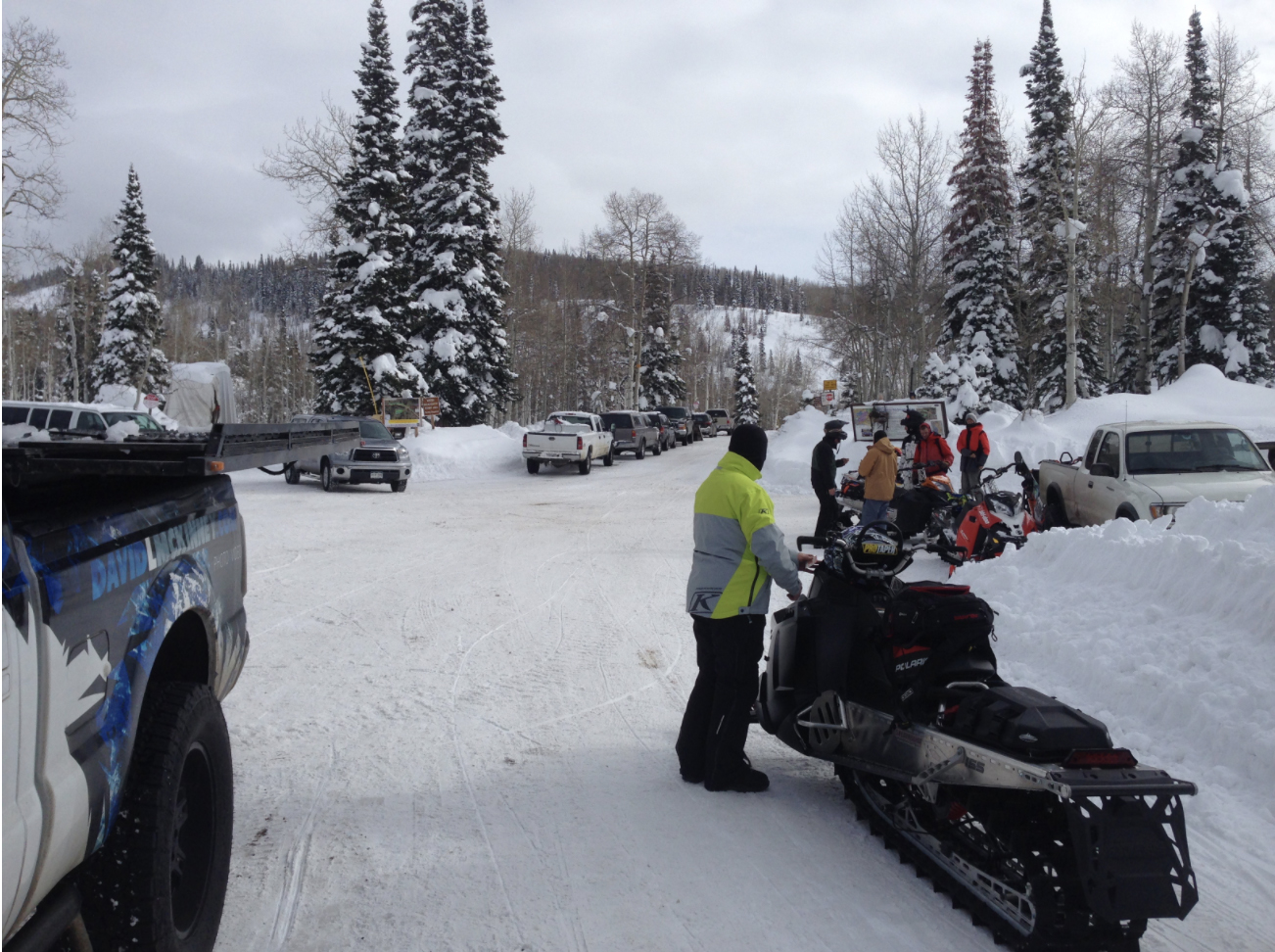
Steamboat Powdercats’ permit with the Routt National Forest is not exclusive, meaning they cannot close areas to public access. They do not perform avalanche mitigation with explosives. When the company builds a snow-packed road using snowcats to access pick-up and drop-off points for their skiers, they do not have exclusive use of that road, said Aaron Voos, the public affairs specialists for the Medicine Bow – Routt National Forests.
The company’s director, Eric Deering, said the lawsuit is about proprietary information and not about shutting down publication of a guidebook. They tried to reach out to Bass to discuss the guidebook “and he never called us back,” said Deering, who directed questions about the lawsuit to Clapp.
The “primary issue” behind the lawsuit, Clapp said, is public safety.
Using the names the company assigned to certain areas and runs could give skiers the impression that the zones are well-traveled, Clapp said.
“When they really are only well-defined and known to the 17 or so people who work for Powdercats at any given time,” Clapp said.
Some of the areas are “very tricky,” Clapp said, where people can easily venture into dangerous avalanche terrain.
“This isn’t like a guidebook you can use when you are going on a hike somewhere with marked trails and signs and waypoints and markers,” he said.
Clapp said Steamboat Powdercats called Bass “to figure out how they could work with him to come up with a better way to understand this terrain.”
“It’s not about prohibiting use or stopping the development of a guidebook but to create one that didn’t use proprietary information that was created over years and years of experience in that area,” Clapp said. “This has to be clear. Powdercats has offered and is willing to work with Bass.”
Bass said he told Steamboat Powdercats boss Deering and longtime manager Kent Vertrees that publishing route names would help get the company, the public, the Forest Service and the local search-and-rescue team on the same page.
“So if someone broke their leg in ‘Maneater,’ not only would Powdercats know where that was, but the skier with the broken leg and search and rescue would know where that was too,” Bass said. “It would be great to get all those run names out there in the community. In my opinion it would really solidify Steamboat Powdercats’ legacy on Buff Pass.”
Bass said when Vertrees called him back after receiving the first draft of the book, “he was pretty fired up.”
“He told me there’s just going to be so much rampant overuse of Buff Pass now and we are not going to have anything to ski,” Bass said. “I do understand that concern. They are looking at this from their eye as a commercial operator. I’m looking at this from the eye of the public. And it’s safe to say we are not seeing eye to eye.”
Since the late 1970s, the local snowmobile group Routt Powder Riders has used state money collected from snowmobile registration to support trail grooming on Buffalo Pass. The group has worked with Steamboat Powdercats since the 1980s to help manage the private snowmobilers and share information about non-motorized areas and how to share the slopes with a commercial operation.
In recent years, the snowmobile scene on Buffalo Pass has changed. It’s not just snowmobilers out for a cruise. More “hybrid” snowmobilers are using their increasingly powerful machines to access slopes for skiing. These skiers on snowmobiles use the machines to reach the top of remote lines, largely following roads builts by Steamboat Powdercats.
“The biggest single problem is hybrid skiing is very, very popular on Buff Pass,” said Ed Calhoun, the eight-year president of Routt Powder Riders. “And when a sport becomes very, very popular it starts interfering with someone else. There are a lot more hybrid skiers using snowmobiles up there and that has probably given Powdercats some heartburn and I understand that. But I also understand the point of view of the public who want to go into the forest and explore their public lands.”
After receiving a cease-and-desist letter from Steamboat Powdercats earlier this fall, Sovick and Bass discussed making up new names for runs and roads.
“It doesn’t have to be this way. We came with a peace pipe, asking them to help with the book, and they threw this bomb in my face,” Sovick said. “This is public land and names. We are talking about invisible lines on snow that we are drawing on a map. Not sure how you can claim ownership of something like that. The issue is they are trying to find a way to keep people from accessing our public land and they are exercising every tool they have.”
Sovick said he takes responsibility for disseminating good information about avalanche terrain, backcountry etiquette and sharing the land with others. The book includes tips for snowmobilers about passing a snowcat, where they might encounter a snowcat and how to ski in an area where Steamboat Powdercats is bringing their guests.
“We work hard to be part of the backcountry community and make sure we are giving good information to readers. We try to be proactive,” Sovick said. “The issue should not be about keeping this area a secret. The issue should be how do we best guide people through this terrain.”
Lou Dawson, a pioneer of backcountry skiing in Colorado, said search-and-rescue teams could be troubled if terrain features, runs and routes around Buffalo Pass had more than one name.
“It’s disconcerting that snowcat operators would make the names their point of contention,” said Dawson, who recently wrote a 30-location guidebook for Beacon that details tours through low-risk terrain in Colorado. “It seems pretty likely that their main problem is they don’t want other people using that terrain. That’s a guess. But why else would they be so concerned about a guidebook?”
Buffalo Pass has been a relatively safe zone for backcountry skiing and snowmobiling, especially compared to steeper, more avalanche prone areas in the West Elk or the San Juan ranges. Even with heavy traffic, the area does not see many avalanche incidents or accidents.
“But this could create some public safety problems more than public assistance,” Clapp said.
Steamboat Powdercats manager Vertrees has worked for decades with the Forest Service, human-powered skiers and motorized users in the area, helping to create a unique system that combines multiple recreational pursuits alongside his permitted snowcat operation.
He was part of a winter task force in the early 2000s that helped the Forest Service come up with a plan for management of the area. A comprehensive environmental analysis by the Forest Service in 2005 included months of meetings with a winter task force of Buffalo Pass users. The final plan required skiers and snowmobilers to register for a permit to access a 7,300-acre area on the west side of Buffalo Pass. The plan also designates areas where only non-motorized use is allowed. The free permit — available at the trailhead and the local Forest Service office in Steamboat Springs — sets aside large areas where snow machines can’t go and designates specific routes for motorized traffic.
The management system is similar to the one used at Vail Pass Winter Recreation Area. That plan, which coordinates motorized, non-motorized and commercial operations on the pass, was developed in the early 1990s by the Vail Pass Task Force and the Forest Service. Vail Pass has areas set aside for skiers, groomed trails for snowmobiles and has had fees for snowmobiles and other uses since 1998. The pioneering fee program costs motorized users $10 a day and $65 for a season pass.
Fees for motorized access around Buffalo Pass have been discussed, but the day and season passes for the area have remained free. The Routt County Recreation Roundtable, of which Vertrees is a member, still works to encourage collaboration between the various recreational interests around Steamboat Springs, including motorized and non-motorized winter users.
“We are staunch proponents of public land,” said Vertrees of Steamboat Powdercats.
Jon Miller has been snowmobiling and snowboarding on Buffalo Pass since the early 1990s. “We used to be able to ride our snowmobiles anywhere back then. Now it’s a completely different world,” said Miller, the founder of Backcountry United, a nonprofit that works to connect human-powered and motorized backcountry groups with resources, avalanche education and stewardship projects.
The snowmobile community on Buffalo Pass for years worked to avoid conflicts with Steamboat Powdercats and its clients, Miller said. But the sheer number of snowmobilers and backcountry skiers on the pass on snowy weekends has led to more congestion and parking issues, leaving Steamboat Powdercats employees as enforcers of rules.
So while Miller described Steamboat Powdercats as “very territorial,” he said he can understand the company’s frustration with increasing crowds affecting the business.
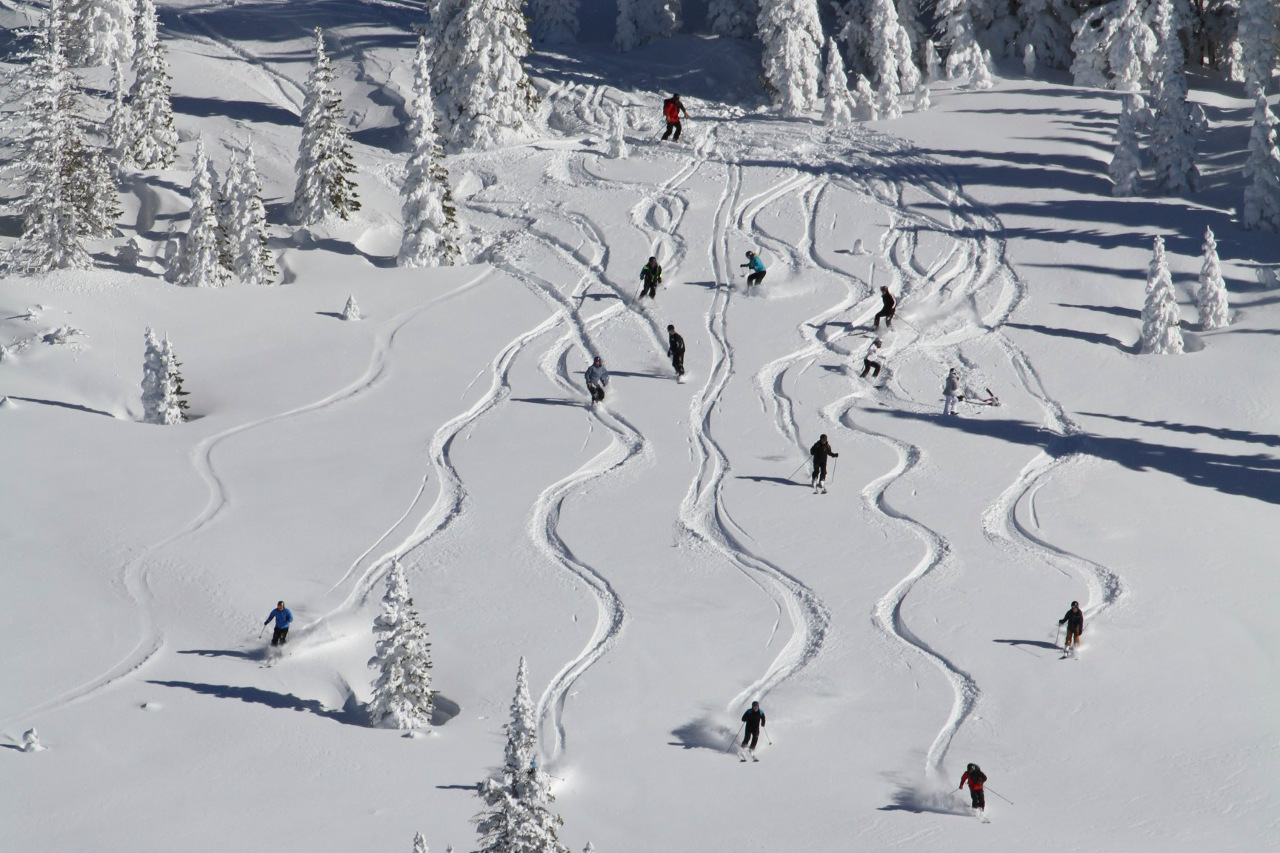
“They kinda operate like they own the place up there. And they don’t. It’s public land,” Miller said. “That said, I personally don’t want that guidebook to be published because we just don’t need any more traffic up there. I see this from both perspectives, I guess. I will say that place is a ****show right now.”
So maybe with a guidebook, people can be made aware of the issues and terrain up there and it won’t be such a circus, Miller said.
“I wonder if the people who take the time to read the guidebook might be more respectful and try to know as much as they can before they get there,” Miller said. “It seems to me those people might cause the least amount of problems.”
Bass, 34, said his goal is to promote safe access “and share the stoke of Buff Pass.”
“They see me spreading that stoke as infringing on their operation,” he said. “I’m usually a pretty level-headed, quiet ski guide and now I’m talking to a reporter and I’m talking to a lawyer. I’m a nerd. I like snow science. I like weather. I like to shred. I didn’t get involved in the ski community to fight legal battles with other people who like to shred. I’m in the weirdest situation right now, man.”
Bass said he feels like he’s taking the blame for all the growth in traffic in recent years on Buffalo Pass.
He worries that a lawsuit from an outfitter on public lands could set a precedent that spills over to climbing, mountaineering, rafting, mountain biking and hunting on public land, all of which have outfitters that offer guided experiences on Forest Service and Bureau of Land Management lands in the western U.S.
“I think this is so much bigger than me,” Bass said. “If someone spends years gaining knowledge of our public lands and when they try to share that knowledge, they can get sued, that’s crazy. This could have rolling ramifications for way more than skiing. I intend to fight this. We shouldn’t be bullied just because a commercial operator has deep pockets, especially when it comes to our public lands.”
Source: The Colorado Sun — Jason Blevins, jason@coloradosun.com


